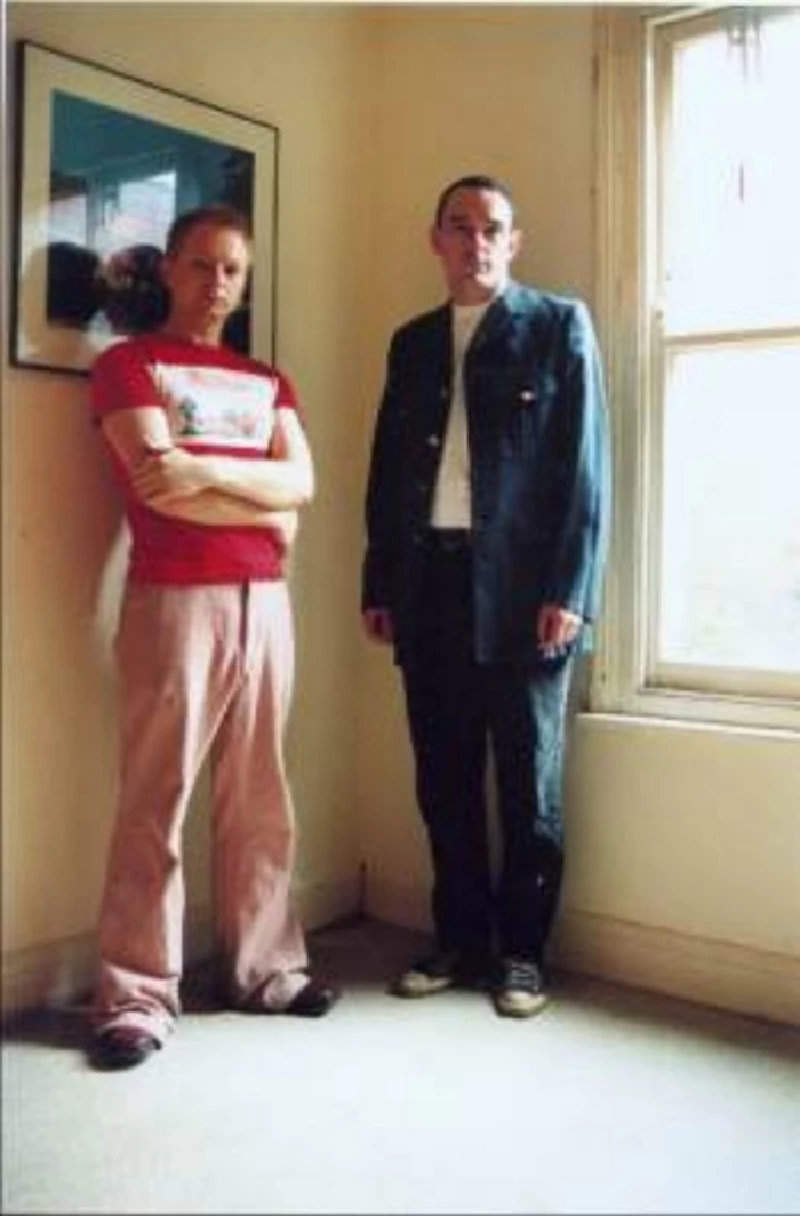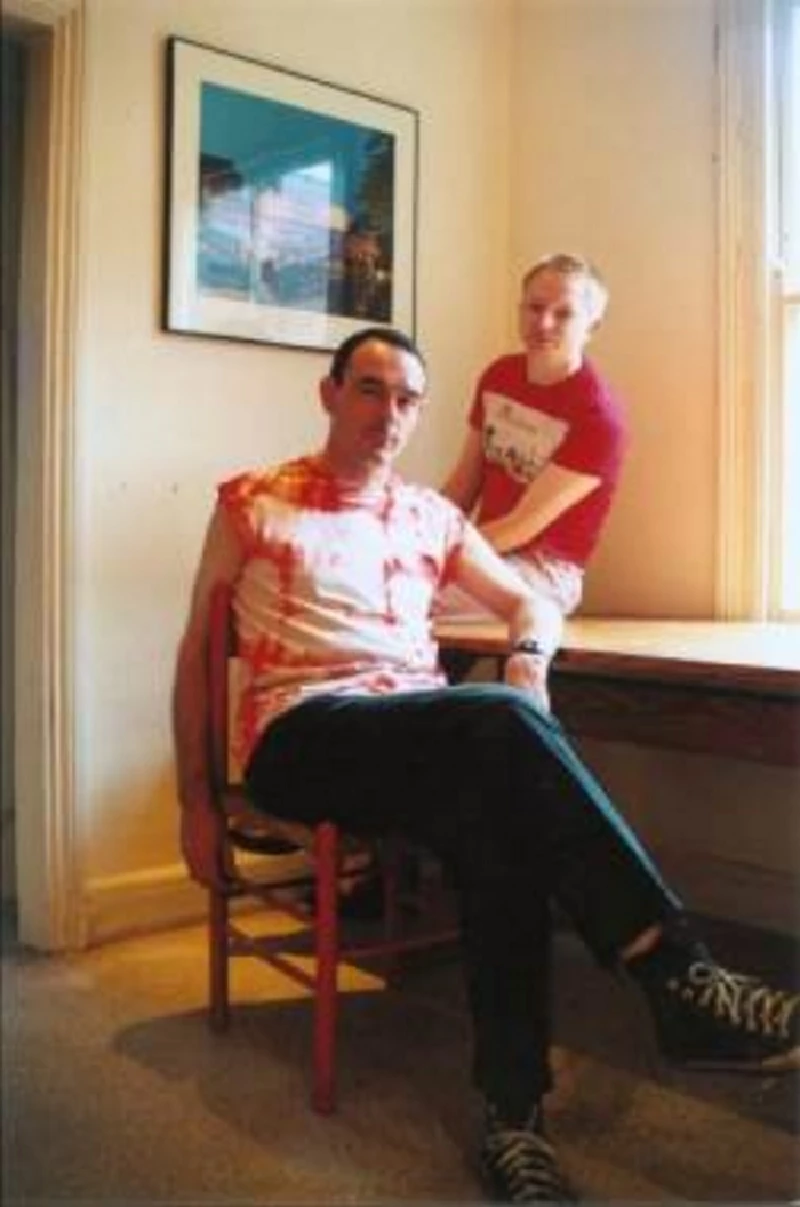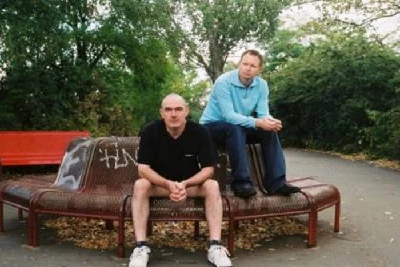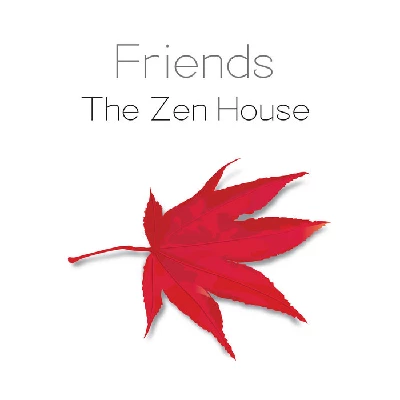Friends - Interview Part 2
by Tommy Gunnarsson
published: 19 / 11 / 2003

intro
In the second part of our interview with William Jones, the frontman with long-serving indiepop group Friends, he talks to Tommy Gunnarsson about the unusual reasons why the band's seminal first album, ‘Roads Leading Everywhere’ remains their most popu
PB : Do you like you own records ? WJ : I like some of them. The third album, ‘Songs Without Tears’, I don’t like that at all. The sound is as good as the first two albums, but the production isn’t as good, and I produced it, so I am not happy about that. That’s partly why we have used other producers since . I felt that was as far as I could take it. Some of the early songs I love to listen to. Some of them I don’t. I think they are kind of childish. That was what I felt at that time though. Some I feel embarassed to listen to. Some I feel disappointed that we didn’t make them better, and some I am really proud of. I know that a lot of people like the early stuff best. I can’t say they are wrong, and have to concede that there is something about them which is good. PB : Are those your favourite tracks on the compilation album, ‘Best of Friends’ , that you put out ? WJ : No, it’s a mixture really. We have got about 100 songs that we have recorded, of which we wanted to put on 60 or 70, but we couldn’t of course, so we decided that all the ones that had got the most radio play and the best reviews and best feedback from people they had to be there,as that was people’s judgement about what was the best. It was a part of many things though, and we also wanted to a range of songs that represented different styles, some with trumpet, some without, some with acoustic guitar, some with electric guitar, some slow songs, some fast. We wanted something off each album, and if we could something off each single, although we didn’t put the first single on. Have you heard the first single ? PB : No. WJ : You probably don”t want to (Laughs). We reckoned that there was no way we could say the first single was ‘Best of Friends’, and so we just went with what other people told us was best, plus a mixture of arrangements and styles. There’s very laidback songs. There’s quiet songs. There’s loud ones, and rocky ones. There’s slightly gothic ones. We wanted to represent the whole range. PB : And you did that well. Whats your own favourite song ? WJ : My own favourite song is called ‘Beautiful to Me’. It’s off the last album, ‘Beautiful You’. Before that my favourite was ‘Day by Night’, a song off the compilation. PB : Do you have a favourite album ? WJ : My favourite album is the last one. That’s quite common for musicians to say that, isn’t it ? It hasn’t always been like that though. After we recorded the third album, that wasn’t my favourite. You’re bound though to think that your most recent work is your best, “Beautiful You’ is the album I have most listened to with most pleasure . We had a big break between our sixth album ‘Folk Songs’ and ‘Beautiful You’, so we had a chance to put together a set of good quality songs. After a gap of about six years, it really should, therefore, be one of our best. They’re the ones that I think I have recorded the best. I don’t mean in terms of production quality really. We worked very hard and got some of our best perfomances. PB : Can you make a living out of music ? WJ : No, we work. I have a job. PB : What do you work as ? WJ : I am a marketing director. I worked in the Arts for about 20 years, and managed Arts organisations and marketed them. For the last couple of years I was Head of Marketing at a big Arts centre, the Barbican in London, but I have moved out of the Arts and am now Head of Marketing for a big charity in London. PB : Would you like to make a living out of music ? WJ : Yes, but it would have to be a very good living in order to have to give up work, because there’s so many things about my work which I enjoy. I enjoy being with other people and managing people, and I enjoy the work that I do. It’s very valuable. In the early days we talked about going on the dole and writing songs and looking for a record deal, but first of all we couldn’t afford to and secondly I thought that it would be lonely and frustrating. I write a lot of songs. I would probably write more songs without working. I probably could have spent more time promoting the band, but who knows ? We may still not have been massive, and we still may not have been making a living on music. We have stiill got records out. They sound the way they want. There’s a few thousand people around the world who know our music and like it. I’d like it to be more, but I’m happy with the way things are. PB : Would you like to be bigger ? WJ : Yeah, I would like to be bigger, but I am happy with what I have. PB : How many copies do the record sell ? WJ : It depends with different albums, but usually about 3000 to 5000 per album. PB : Which is your bestelling album ? WJ : The most bestselling is the first album, ‘Roads Leading Everywhere’. I think that is the way for us all (Laughs) PB : Why is that ? WJ : It is partly because it came out in 1988. It is very reminiscent of its time. There was a lot of that kind of music out at the time. It was very popular and a lot of the music press were very keen on it and it was very well reviewed and got a lot of airplay and it became popular as well in places like Japan and Spian and Germany where most of them sold, but styles change and the shoegazing movement and the dance movement came along. PB : (Laughs) You were never tempted by that ? WJ : No. We have never been interested in making a complete change of style to follow what is going on out there. Some people say all our songs sound very similar. I would say that we have one style, but we have a whole range of ways of projecting that. There is a song on ‘Bluishness’ (Friends’ fourth album from 1992) at its very end, ‘Into the Crystal Blue Horizon’ which is a very long kind of psychedelic song, and we used to play that live and people used to shout shoegazers at us (Laughs) ! And so I think there is something in the songs that is varied Going back though to why ‘Roads Leading Everywhere’ is the most popular, I think it has also been the bestseller because it came out originally on vinyl, and a lot of people bought it on vinyl. Then people started buying CDs and stopped buying vinyl, so we did a CD edition. A couple of summers ago we got licensed by Vinyl Japan on vinyl and they took a load of records to sell in Japan, so it really has had three chances to sell, so it has done alright. It has made a nice profit for us. PB : What kind of market do you have in the UK right now ? WJ : I don’t know. I am very out of touch. It’s not particulary promising for a band like us. I would say that we are a very traditional band in the way that we are set up. We’re not partiuclary radical sounding. We don’t fit into many trends, plus we have been going a long time and we’re not kids. We’re not the latest new thing, so it is difficult. The way we look at it England is just a tiny part of our market, the market of our world and if we’re not successful or popular in England it’s a pity, but it’s not a big deal. PB : Are you big in Germany at the moment ? WJ : We sell a fair number of records in Germany. Yeah ! We get a lot of press reviews and airplay. PB : Is is less easy to be an indiepop band now than it was ? WJ : Yeah ! because indiepop music at that time was much more in touch and focused with the interest of young people, Indiepop was a big part of people’s lives who were interested in music, while now they’re into clubbing and computer games and at the same time the media has changed. There used to be three big weekly music newspapers, ‘Sounds’, “Melody Maker’ and “NME’, and in our case everything we put out in those days was reviewed. There was far more media. Local radio stations used to have a rock show which would play our kind of stuff. Radio 1 had janice Long and John Peel at times in which you could actually hear them, and they would play our kind of stuff, and now it is much more concentrated. There is one weekly music paper, ‘NME’, and local radio stations play chart music on rotation, and it is much more kind of segmented to the teenage market for everything, and there’s not particulary a niche for us, so it much harder to break through if you are a band these days. The third and final part of this interview will follow next month
Picture Gallery:-


interviews |
|
Interview (2007) |

|
| In our third interview with them, Sarah Johnson speaks to William Jones from durable indie pop group Friends about the band's just released ninth album, 'Spangleland', and recent return to live work after an absence of nearly 15 years |
| Interview with William Jones (2004) |
| Interview Part 3 (2003) |
| Interview Part 1 (2003) |
reviews |
|
The Zen House (2011) |

|
| Flawed acoustic tenth album from long-term London-based indie-pop outfit, Friends |
| Single Friends (2009) |
| Spangleland (2007) |
| Late Night Early Morning (2004) |
| Beautiful You (2002) |
| Best Of (2002) |
most viewed articles
current edition
Carl Ewens - David Bowie 1964 to 1982 On Track: Every Album, Every SongArmory Show - Interview with Richard Jobson
John McKay - Interview
Colin Blunstone - Thalia Hall, Chicago, 16/7/2025
Billie Eilish - O2 Arena, London, 10/7/2025
Bathers - Photoscapes 1
Visor Fest - Valencia, Spain, 26/9/2025...27/9/2025
Loft - Interview
Sir Tim Rice - Interview
Robert Forster - Interview
previous editions
Manic Street Preachers - (Gig of a Lifetime) Millennium Stadium, Cardiff, December 1999Heavenly - P.U.N.K. Girl EP
Beautiful South - Ten Songs That Made Me Love...
Oasis - Oasis, Earl's Court, London, 1995
Peter Perrett - In Dreams Begin Responsibilities Interview Part One
Boomtown Rats - Ten Songs That Made Me Love....
Coldplay - Wembley Arena. London, 16/8/2022
Prolapse - Interview
Pixies - Ten Songs That Made Me Love...
Trudie Myerscough-Harris - Interview
most viewed reviews
current edition
Davey Woodward - Mumbo in the JumboSick Man of Europe - The Sick Man of Europe
Lucy Spraggan - Other Sides of the Moon
Amy Macdonald - Is This What You've Been Waiting For?
Phew, Erika Kobayashi,, Dieter Moebius - Radium Girls
Bush - I Beat Loneliness
Suzanne Vega - Flying With Angels
Alice Cooper - The Revenge of Alice Cooper
Cynthia Erivo - I Forgive You
Blueboy - 2
Pennyblackmusic Regular Contributors
Adrian Janes
Amanda J. Window
Andrew Twambley
Anthony Dhanendran
Benjamin Howarth
Cila Warncke
Daniel Cressey
Darren Aston
Dastardly
Dave Goodwin
Denzil Watson
Dominic B. Simpson
Eoghan Lyng
Fiona Hutchings
Harry Sherriff
Helen Tipping
Jamie Rowland
John Clarkson
Julie Cruickshank
Kimberly Bright
Lisa Torem
Maarten Schiethart